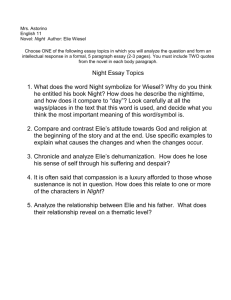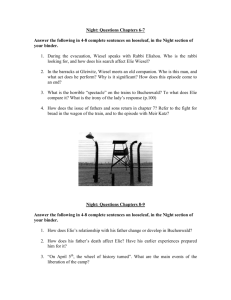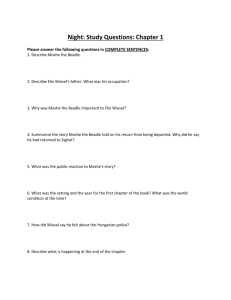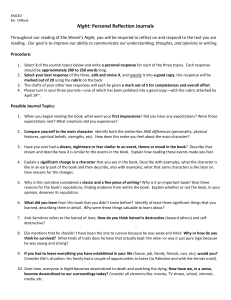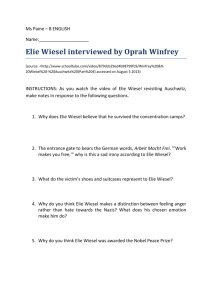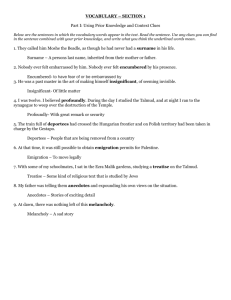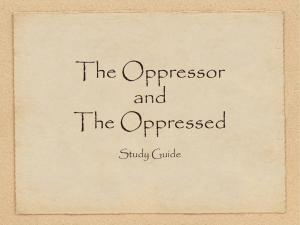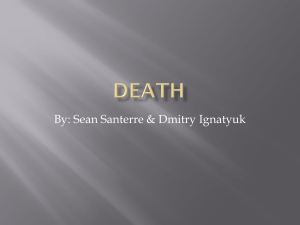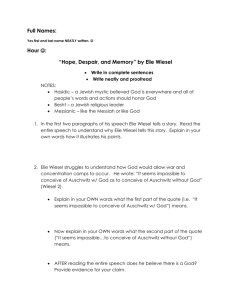Night Study Guide I
advertisement
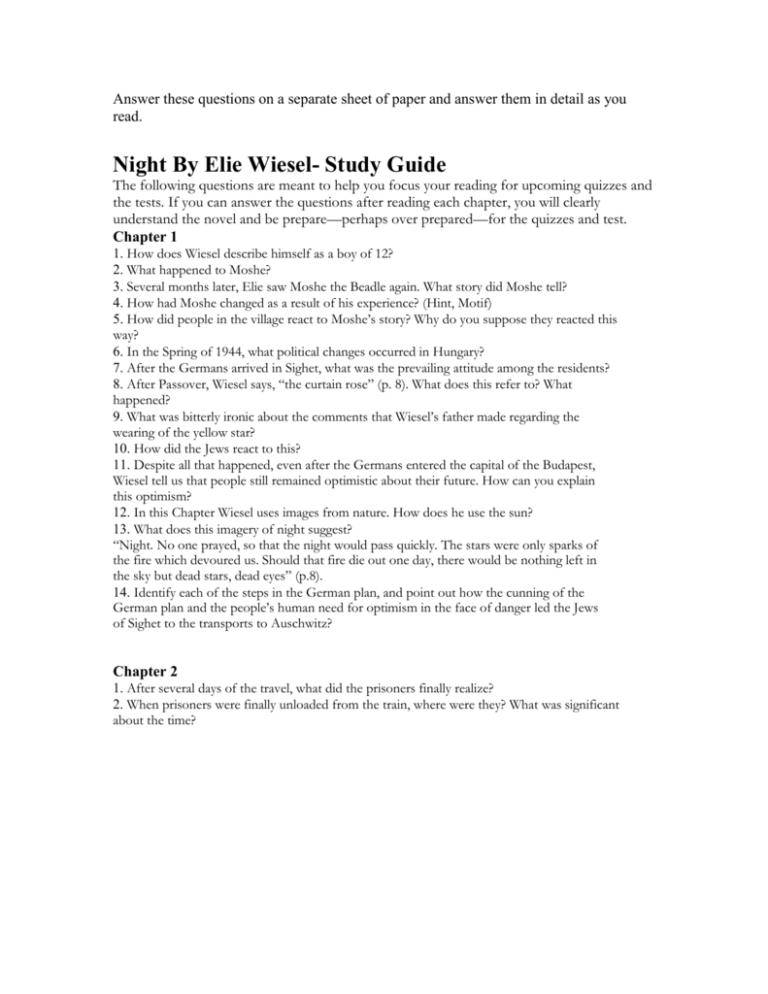
Answer these questions on a separate sheet of paper and answer them in detail as you read. Night By Elie Wiesel- Study Guide The following questions are meant to help you focus your reading for upcoming quizzes and the tests. If you can answer the questions after reading each chapter, you will clearly understand the novel and be prepare—perhaps over prepared—for the quizzes and test. Chapter 1 1. How does Wiesel describe himself as a boy of 12? 2. What happened to Moshe? 3. Several months later, Elie saw Moshe the Beadle again. What story did Moshe tell? 4. How had Moshe changed as a result of his experience? (Hint, Motif) 5. How did people in the village react to Moshe’s story? Why do you suppose they reacted this way? 6. In the Spring of 1944, what political changes occurred in Hungary? 7. After the Germans arrived in Sighet, what was the prevailing attitude among the residents? 8. After Passover, Wiesel says, “the curtain rose” (p. 8). What does this refer to? What happened? 9. What was bitterly ironic about the comments that Wiesel’s father made regarding the wearing of the yellow star? 10. How did the Jews react to this? 11. Despite all that happened, even after the Germans entered the capital of the Budapest, Wiesel tell us that people still remained optimistic about their future. How can you explain this optimism? 12. In this Chapter Wiesel uses images from nature. How does he use the sun? 13. What does this imagery of night suggest? “Night. No one prayed, so that the night would pass quickly. The stars were only sparks of the fire which devoured us. Should that fire die out one day, there would be nothing left in the sky but dead stars, dead eyes” (p.8). 14. Identify each of the steps in the German plan, and point out how the cunning of the German plan and the people’s human need for optimism in the face of danger led the Jews of Sighet to the transports to Auschwitz? Chapter 2 1. After several days of the travel, what did the prisoners finally realize? 2. When prisoners were finally unloaded from the train, where were they? What was significant about the time? Chapter 3 1. The men were then marched before Dr. Josef Mengele. What did he do? What was his purpose? 2. When some of the younger men wanted to rush the guards, even if they died in the effort, what did the older people counsel? 3. What did Elie witness while he was standing in line? What was his reaction to what he saw? 4. The scene of Wiesel and his father approaching the inferno is particularly vivid. How is such artistry achieved? 5. What did Elie revolt against? 6. One way an author has to effectively emphasize a point is through selective repetition of a word phrase. What rhetorical device (literary device) does Wiesel employ to highlight the horror of his first night in the concentration camp? 7. This marked the end of Elie’s first night at Auschwitz. What natural sign marked the beginning of the next day? What does Elie tell us of the change in himself? 8. How did Elie respond to Stein’s request for information? 9. Why was the prisoner in charge of their block replaced? Find the ironic statement on page 10. Stein continued to visit the Wiesels, but suddenly they no longer saw him again. What happened to Stein? 11. How did some religious Jews see their troubles? How did Elie feel about God? Chapter 4 1. As part of their medical examinations, prisoners were examined by a dentist. What was he looking for? 2. Why was Elie so pleased about saving his gold crown? 3. Who cleaned the blood from Elie and soothed him with kind German words? What was unusual about her? 4. Elie tells of meeting this same woman many years later in Paris. What important question did he ask her, and what was her reply? Which literary device is being used to describe this scene? 5. How did the foreman get revenge on Elie and his father for refusing to give up the gold tooth? 6. What did Elie finally do? What was the irony in all of this? 7. All of the Kapos were also prisoners, and most were Jewish, are you surprised about how cruel and greedy they were? 8. Why was a prisoner shot during an Allied air raid on the prison camp? 9. Why were the prisoners happy about the air raid even though they might have been killed by the bombs? 10. One day, the prisoners were told that soup would not be distributed until after roll call. Why was this? 11. What other public execution does Wiesel write about? 12. Why was this execution particularly cruel?
